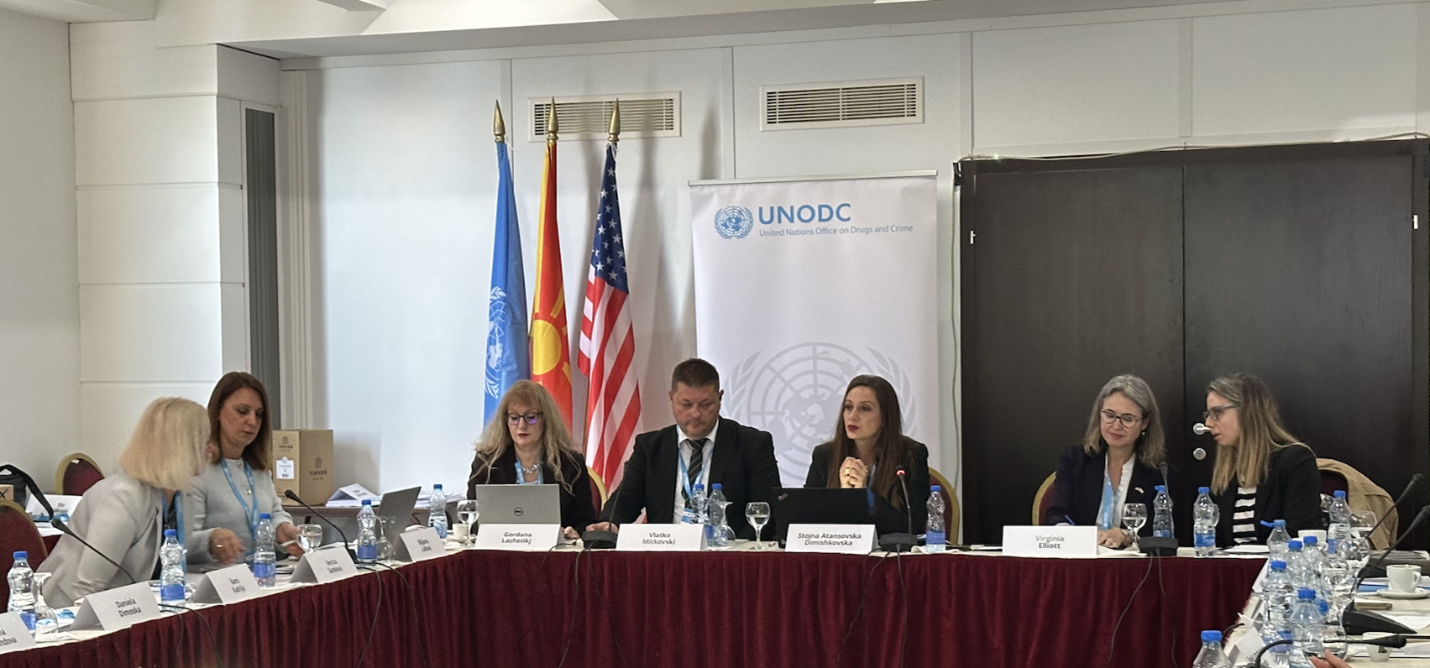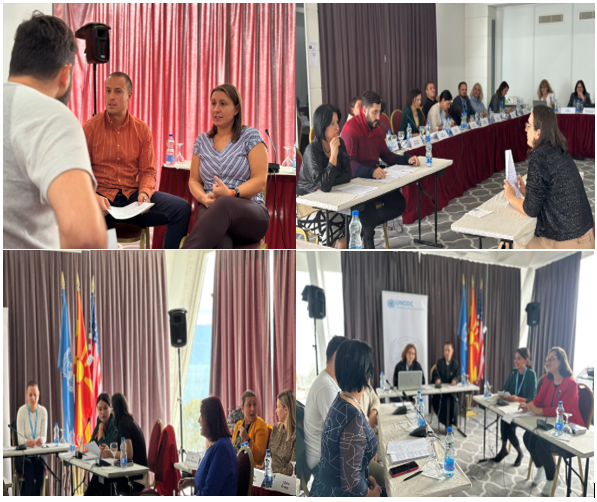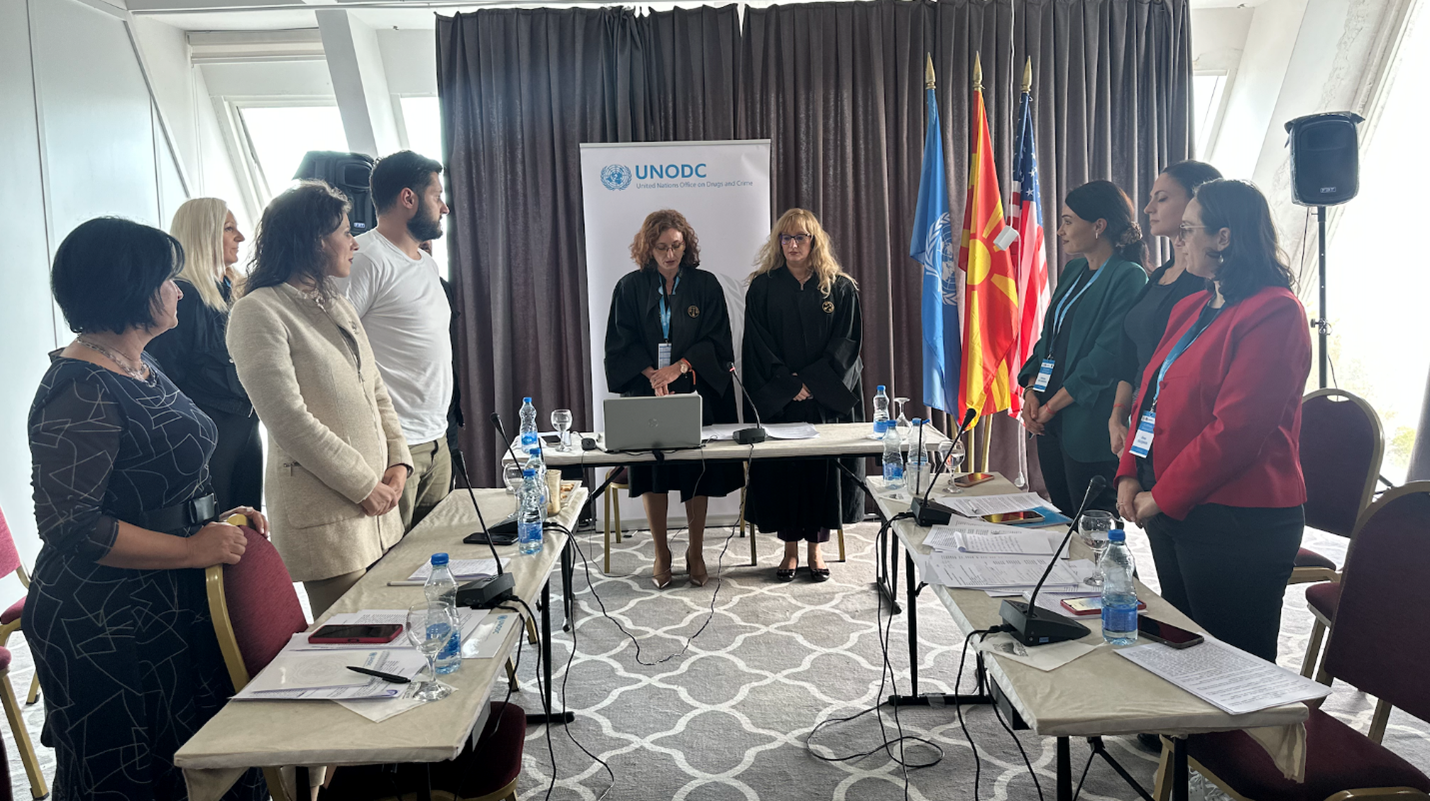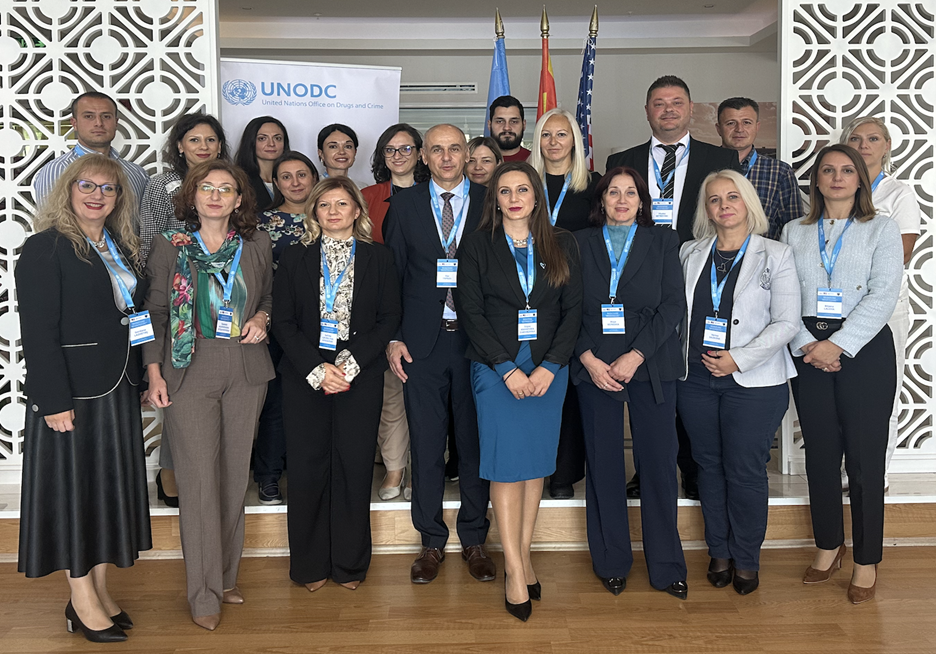North Macedonia: Mock Trial and Investigation Simulation Strengthens Anti-Trafficking Response
7 – 10 October 2024, Struga, North Macedonia - The United Nations Office on Drugs and Crime (UNODC), in collaboration with the Academy of Judges and Public Prosecutors and the Training Center under the Ministry of Internal Affairs of North Macedonia, hosted a three-day mock trial on trafficking in persons.
Supported by the U.S. Department of State's Office to Monitor and Combat Trafficking in Persons, the training brought together 26 judges, prosecutors, investigators, social workers, and civil society representatives, to build skills to detect, investigate, and prosecute trafficking cases whilst prioritizing the protection of victims.

Opening remarks delivered by: Ms. Stojne Atanasovska Dimishkovska, National Program Officer, UNODC; Ms. Virginia Elliott, Director, Bureau of International Narcotics and Law Enforcement Affairs (INL), U.S. Embassy; and Mr. Vlatko Mitkovski, Assistant to the Minister, Training Center, Ministry of Interior, Republic of North Macedonia, Mr. Iliri Iseni, Deputy DirectorAcademy of Judges and Public Prosecutors (online).
Using realistic scenarios, the participants immersed themselves in mock investigations and trial processes, designed to simulate every stage of a human trafficking case—from victim identification to a final verdict. The participants assumed various roles in the criminal justice chain, allowing them to blend theoretical knowledge with practical experience.
Discussions during the event focused on innovative approaches, such as using video conferencing to safely interview child victims, and strategies for addressing legal loopholes in trafficking cases.
A multidisciplinary approach to criminal justice
The multidisciplinary approach of the mock trial left a significant impression on the participants. Andrijana Markovska, a lawyer and project coordinator at the Macedonian Young Lawyers Association, said: “The training had an important focus on early identification of trafficking victims. The exchange of knowledge with colleagues from various key institutions was also very valuable in terms of coordination during all phases of the trial.”

Scenes from the simulation: Police officers interview an individual reporting a suspicious situation; the defendant gives a statement to the public prosecutor; an expert in neurology and psychiatry, specializing in forensic psychiatry, gives testimony during the main hearing; both parties present their closing arguments.
Similarly, Cvetanka Kamcheva Zlateva, Shelter Coordinator at Open Gate-La Strada, highlighted the comprehensive nature of the simulation. “This was excellent practice that helped me understand the steps needed to support and prepare victims for the most sensitive parts of the process. I will share this knowledge with my colleagues directly involved in assistance and support programs,” she said.
According to Biljana Kostenchevska, Inspector for Juvenile Delinquency at the Ministry of Interior, the training enabled the participating practitioners to apply standard operating procedures for human trafficking cases. “The focus on early detection, evidence collection, and victim protection, along with cross-sector cooperation, made this training particularly significant.”
Practical insights from practitioners
The simulation offered participants an opportunity to expand their practical skills. Simona Popandonova, an investigative collaborator at the Basic Public Prosecutor's Office for Organized Crime and Corruption, noted that “the participation of multiple institutions dealing with trafficking cases helped us understand how important it is that we work together to ensure effective victim protection and support.” In her opinion, the simulation also enabled participants to recognize key elements of trafficking in persons and distinguish it from other criminal offenses.
Elma Sulejman, prosecutor from the Basic Prosecutor’s Office in Skopje, shared her experience: “The interaction with the lecturers and other participants helped us find better ways to gather and present evidence before the court.”

Scene from the trial: The judge announces the verdict.
The training fostered a collaborative learning environment. Judge Fanka Janculevska Mihailovska described the experience as one of deep engagement: “The practical exercise reinforced my conviction that legal professionals must continuously improve their skills and adhere to the highest ethical standards.”
“Each phase of the process is essential” shared Judge Daniela Aleksovska-Stojanovska. “If any part fails, it jeopardizes the entire case. This simulation provided invaluable insights into the challenges faced by other institutions, deepening my understanding of the need for strong coordination between all institutions involved.”
Judge Aleksovska-Stojanovska concludes, “this training allowed me to establish new contacts, which is crucial for direct communication and effective cooperation between institutions."
A path towards stronger accountability
The mock trial organized by UNODC provided a platform for North Macedonia’s justice system to enhance its response to human trafficking. Stojna Atanasovska Dimishkovska, UNODC National Project Officer, highlights: “This was more than a training—it was a crucial step towards a stronger criminal justice response to human trafficking in North Macedonia. The participants are leaving the training equipped with essential tools and a deeper understanding of how collaboration is key to safeguarding victims and ensuring that justice is served.”

Group photo of the mock trial participants
In recent years, UNODC has developed a mock trial methodology specifically designed for trafficking in persons cases. This methodology, detailed in a related manual, has been successfully applied in multidisciplinary capacity-building activities across multiple countries, including in South-Eastern Europe. This manual served as a foundation for developing a tailored national case methodology to enhance the handling of trafficking cases in North Macedonia. Lecturers from the Academy of Judges and Public Prosecutors and the Training Center under the Ministry of Internal Affairs of North Macedonia were actively involved in co-designing and delivering the mock trial. They received practical training and mentoring from UNODC, equipping them with the skills needed to effectively disseminate the developed materials and knowledge to future students. This comprehensive approach was designed to ensure the sustainability of expertise and resources to foster a unified, strategic approach to combating trafficking in the country.